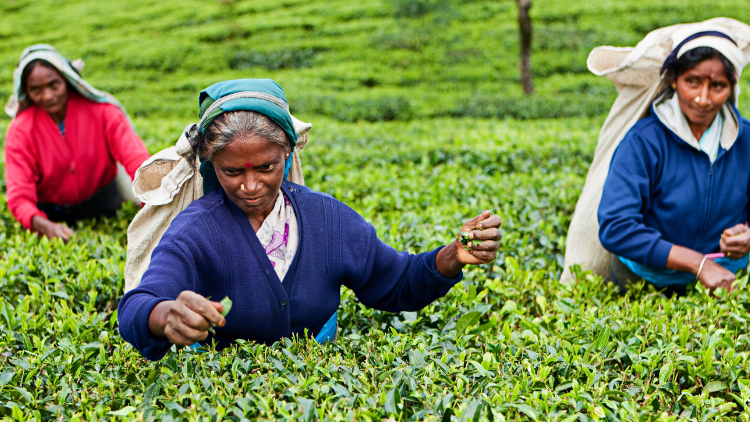SME in Sri Lanka
Small and Medium-sized Enterprises (SMEs) of Sri Lanka

Tamil tea pickers, Sri Lanka
© Hadynyah from Getty Images Signature via Canva ProSmall and medium-sized enterprises (SMEs) play a pivotal role in maintaining the economic fabric of Sri Lanka, contributing significantly to employment, GDP and social stability. These businesses, characterized by their limited scale in terms of employees, revenue and assets, are the backbone of the Sri Lankan economy. This article delves into the current situation of SMEs, their challenges and support mechanisms available while contemplating future policy directions for a resilient SME sector.
Current situation – Surviving amidst an economic meltdown
The Sri Lankan SME landscape is diverse, encompassing a range of sectors such as agriculture, manufacturing, services and information technology. These enterprises are crucial to the country's economic diversity, resilience and the promotion of innovation and regional development.
The SMEs in Sri Lanka represent over 75% of all businesses, account for 45% of employment and contribute 52% to the GDP . In 2013/ 14, SMEs constituted 98.5% of all industrial enterprises, with their employment figures representing 45.7% of the sector's total workforce. Nevertheless, following trends in several other developing countries, the SME sector in Sri Lanka predominantly operates informally.
However, the sector has not been immune to challenges such as the recent economic turmoil, exacerbated by the COVID-19 pandemic, political instability, traditional access to finance barriers and global market fluctuations. Accordingly, business collapses and a rapid decrease in employment was evident during the crisis. As per the findings of the Department of Census and Statistics, SMEs were compelled to increase prices, cut down expenses, and decrease or limit production in response to the economic situation.
Supporting the SME revival – The Role of government and policymakers in Sri Lanka
From the onset of the COVID-19 pandemic and throughout the economic crisis, Sri Lankan regulators took various measures to minimize impacts on the SME sector, recognizing its inherent vulnerabilities. The primary form of support was financial, including loan moratoriums, concessional loans and working capital loans. These were aimed at ensuring SMEs could maintain liquidity, retain employees and survive the immediate fallout of the pandemic.
Digital and physical training and development, mentoring and networking opportunities were introduced to improve the competitiveness of the SME sector. To address collateral issues of the Sri Lankan SME Sector, a National Credit Guarantee Institute is planned, aiming to enhance access to finance for these businesses, with optimistic prospects for future improvement[1].
Moreover, dependence on informal financial sources, which lack formal protections and solid credit history, is significant amongst Sri Lankan SMEs. Notably, the high interest rates and aggressive recovery practices amongst such sources contribute to escalating debt burdens, trapping many, especially women, in a detrimental cycle of debt. Most SMEs are trapped in an unregulated microfinance sector with no existing framework to supervise the burgeoning number of microfinance units. On the other hand, the existing Microfinance Act No. 06 of 2016 No. 6 of 2016 does not provide for mandatory registration requirements and allows companies to operate of their free will. Plans are now in place to create a Credit Regulatory Authority, which is anticipated to address these regulatory issues.
The government, through the Ministry of Industries, Export Development Board and other relevant stakeholders, now has plans to increase the export competitiveness of the SME sector. Most SMEs are seeking opportunities to export their products. However, meeting quality and sustainability standards to enter developed countries remains the most significant barrier. Apparel and textiles, Ceylon tea, coconut and coconut-based products, gems and jewelry and spices are popular export products.
However, improving export competitiveness demands significant policy support. Introducing sustainable business approaches, training and development, technical support and capacity building top the policy agenda to develop export competitiveness of the sector. Implementations occur under the auspices of the National Financial Inclusion led by the Central Bank of Sri Lanka to improve financial inclusion in the SME sector. In these efforts, the continuous support extended by multilateral development partners of Sri Lanka must be acknowledged.
The way forward
SMEs in Sri Lanka are at a crossroads, facing unprecedented challenges and new opportunities. The path forward requires a concerted effort from the government and the SMEs themselves. Strengthening the ecosystem for SMEs through supportive policies, access to finance and capacity-building initiatives is crucial. Equally important is the need for SMEs to embrace innovation, sustainability and digitalization as key drivers of competitiveness and growth.
However, the effectiveness of these initiatives hinges on a cohesive framework wherein government bodies are harmonized to bolster SME support. The National SME Policy Framework deserves a thorough reassessment to ensure its relevance and efficacy, underpinned by a dedicated secretariat responsible for its implementation. Such a holistic strategy will streamline SME development, channeling efforts towards unified, impactful outcomes.
The path forward for Sri Lankan SMEs is one of adaptive resilience, strategic innovation, and unwavering commitment to sustainable development. With the right strategies and support, SMEs in Sri Lanka can overcome the current challenges and continue to be a vital engine of economic growth and development.
Author:
Niroshinie Rathnasinghe
Niroshinie Rathnasinghe is a Manager at the IT Department of People's Bank, Sri Lanka. She has completed her master’s in Business Administration from the University of Sri Jayawardenepura, Sri Lanka.
